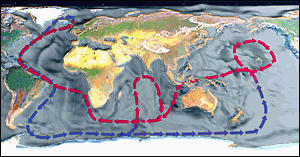
World Climate and Climate Change
Energy from the sun is spread around the world by two mechanisms, the atmosphere and the oceans.

Looking at the diagram above which shows the ocean currents you will see a current in the North Atlantic. This is known as the golf stream. Heat is released in the North Atlantic and then a stream carries water down to the Antarctic region, across to the pacific where it is heated up again and then back to the Caribbean. The golf stream is responsible for the mild weather that Europe enjoys in winter.
In the 1970's an understanding of Continental Drift was accepted, that is how the continents spread apart, then followed an understanding of extensions of the Dinosaurs was developed, meteoric impact. Now we are developing an understanding of how energy is spread around the earth.
The freshening tendency makes the surface water more buoyant, thus opposing the cooling tendency. If the freshening is sufficiently large, the surface waters may not be dense enough to sink to great depths in the ocean, thus inhibiting the action of the ocean conveyor and upsetting one important part of the earth’s heating system.
Global climate is moving in a direction that makes abrupt climate change more probable, that these dynamics lie beyond the capability of many of the models used in IPCC reports, and the consequences of ignoring this may be large. For those living around the edge of the N. Atlantic Ocean, may be planning for climate scenarios of global warming that are opposite to what might actually occur.
The most important point to realise is the increasing the level of CO2 in the atmosphere allows more energy to reach the earth. How this energy is manifested will effect the planet.
Global warming can induce a colder climate for many. As Wallace Broecker likes to say, the Earth's climate system is "an angry beast" and one that we should not be poking with sticks, which of course is exactly what we are doing with all our carbon dioxide and other greenhouse trace gas emissions. We don't know exactly when or how "the beast" will react, but we do know that it eventually will. It's not a matter of whether, it's only a matter of when and how. Those who live in geographical regions affected by the North Atlantic circulation should be especially aware of how sensitive this part of "the beast's" anatomy is to poking and prodding.